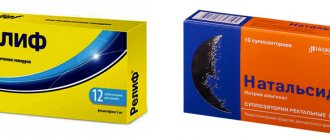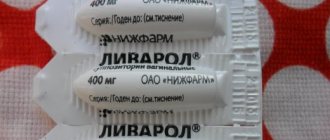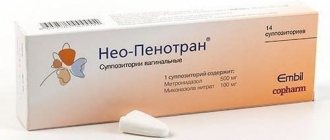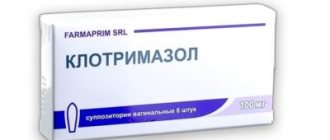Papaverine suppositories and their analogues
Until recently, suppositories were purchased only with a doctor's prescription; nowadays, Papaverine suppositories can be purchased in free form without providing a prescription to a pharmacist. Papaverine suppositories should be protected from moisture, stored in a dark place, the temperature should not be higher than +25 degrees. Shelf life - 2 years.
Before using Papaverine suppositories, you must carefully study the instructions and also pay attention to the instructions:
- Papaverine should be used cautiously for diseases of the kidneys, adrenal glands, and prostate glands.
- The drug should not be taken while drinking alcohol.
- During pregnancy and lactation, the drug is used only under the supervision of a doctor, since the safety for the fetus has not been fully disclosed.
- Papaverine interacts well with other drugs.
Analogs
Riabal - prescribed before an x-ray examination of the colon. The drug is prescribed for vomiting, bloating, spasms of hollow organs, intestinal colic, constipation, hemorrhoids. Spasmolysin - used during pain that is caused by spasm of the smooth muscles of hollow organs, namely gastric ulcers, pancreatitis, proctitis, constipation, colic, and also after operations.
Spasmolin is effective for cholecystitis, gallbladder disease, diseases of the genitourinary system, and is constantly used in gynecology. Niaspam - helps with intestinal spasms, colic, severe, sharp pain in the abdomen. Spascuprel is a remedy prescribed for cramps in the stomach, uterine tone, and urinary tract.
Reviews
Anna, 28 years old. “Papaverine is a wonderful remedy, they gave it to me in the maternity hospital, I had uterine tone, my stomach was always stone-like. I inserted candles once a day, after which I lay down, after a short time the body completely relaxed. It also helped me with constipation when I was pregnant. In my opinion, the substance did not have any negative effect on the fetus.”
Ekaterina, 43 years old. “Indeed, Papaverine is unique, cheap, and helps against all diseases. The doctor prescribed it to me for internal hemorrhoids; I could not go to the toilet normally and experienced pain. The suppositories normalized the stool, and in general I felt good after it. I recommend the drug to all my friends. The doctor told me that you shouldn’t get carried away with it, it can become addictive, as you will have to constantly relax your intestines.”
Papaverine is sold in pharmacies. The average cost of a suppository in a dosage of 20 mg is 70 rubles, 40 mg is 110 rubles. Papaverine is considered an effective drug and is widely used in medicine. The drug should not be used without a doctor’s prescription; the instructions contain contraindications.
Author:
Analogues of the drug
How to replace Papaverine suppositories? Among the analogues of the drug, the following drugs can be distinguished:
- No-Shpa is a medicine that is used for diseases associated with spasm of the smooth muscles of internal organs and blood vessels, as well as for the treatment of periodic pain;
- Spazmolysin suppositories - inserted into the anus for pain syndrome arising from diseases of the gastrointestinal tract and other organs, cholecystitis, pancreatitis, cystitis and other pathologies;
- Spascuprel - used to relax the smooth muscles of internal organs in diseases of the stomach, intestines, pancreas, kidneys and other organs;
- Theophedrine ІС – used for bronchial asthma, obstructive bronchitis to eliminate bronchospasm and ease the patient’s breathing;
- GastroComfort is an antispasmodic and carminative drug that is prescribed to patients with diseases of the digestive system;
- Niaspam - used for irritable bowel syndrome, renal and hepatic colic, and other pathologies of the digestive system.
You should take any of the analogues only after examination by a doctor.
Self-medication often causes serious negative consequences.
Contraindications and side effects
Each medicine has side effects, as well as prohibitions and restrictions on use. Taking into account the hypotensive effect, the drug should not be used by women with hypotension (low blood pressure).
The use of Papaverine suppositories is contraindicated during pregnancy in the following cases:
- presence of ocular glaucoma;
- heart rhythm disturbance;
- tachycardia;
- presence of atrioventricular block;
- severe liver or kidney failure;
- allergic reaction to any component of the drug.
In some cases, suppositories can only be used with caution, and this category includes not only pregnancy, but also disruption of the adrenal glands, the functions of the pituitary gland, as well as hypothyroidism. . The use of Papaverine suppositories during breastfeeding deserves special attention.
To date, there is no reliable data on the effect of the substance on the baby during this period. However, doctors in many clinics and research centers do not recommend using suppositories during lactation. If there is an urgent need for their use, it is better to temporarily wean the baby (for the period of therapy) and resume feeding after treatment.
The use of Papaverine suppositories during breastfeeding deserves special attention. To date, there is no reliable data on the effect of the substance on the baby during this period. However, doctors in many clinics and research centers do not recommend using suppositories during lactation. If there is an urgent need for their use, it is better to temporarily wean the baby (for the period of therapy) and resume feeding after treatment.
Despite the good therapeutic effect and safety for the baby, you should not abuse the use of Papaverine suppositories.
The most commonly observed side effects are:
- hyperemia of the skin caused by excessive expansion of blood vessels;
- the appearance of itching;
- a feeling of fatigue and drowsiness due to the sedative effect of the drug;
- dizziness, darkening of the eyes when changing body position;
- heart rhythm disturbance;
- decreased blood pressure (sometimes below acceptable minimum values);
- unpleasant and uncomfortable sensations in the abdominal area;
- nausea;
- constipation;
- increased sweating.
Despite the safety of Papaverine for the development of the fetus and the effective assistance of the drug in terms of maintaining pregnancy, you should not self-medicate.
Only a doctor should prescribe the use of Papaverine suppositories during pregnancy if there are indications for this drug and the need for its use. Therefore, if any symptoms of malaise, colic, uterine tension, or severe stressful situations occur, you should immediately consult a doctor. Suppositories with papaverine can significantly alleviate the condition of a pregnant woman if all the doctor’s recommendations on how to use the drug are followed. And when a woman knows where to insert suppositories with papaverine during pregnancy, this will help her quickly relieve tension in the uterus, which is a very important point.
Author: Irina Vaganova, doctor specially for Mama66.ru
What side effects should I expect when using the drug?
Practice shows that in the vast majority of cases, the use of Papaverine suppositories to eliminate spasms of smooth muscles is tolerated by patients without any serious problems. At the same time, the drug can give several not very pleasant side effects:
- increased allergic reactions;
- decrease in pressure. The use of Papaverine suppositories for the treatment of patients whose blood pressure is normal should be properly dosed;
- drowsiness, feeling tired, lethargic;
- having problems with concentration. This effect is usually associated with improper hormone production, the symptoms of which intensify after the use of Papaverine suppositories;
- abnormal heart rhythm, which usually occurs in the presence of heart disease; nausea and vomiting due to drug overdose;
- problems with bowel movements, constipation. The reason for their appearance is the deterioration of intestinal motility in the process of relieving spasms;
- increased sweating, which is a consequence of decreased blood pressure. If this effect is observed, you need to reduce the dose of Papaverine suppositories.
Contraindications of the drug
Despite the fact that the use of Papaverine suppositories is in most cases absolutely safe for the patient’s body, there are a number of contraindications to their use:
- individual sensitivity or allergic reactions to the active ingredient itself or to excipients of suppositories;
- glaucoma – intraocular pressure increases; due to the fact that suppositories dilate blood vessels, a significant increase in the negative symptoms of the pathology may be observed;
- the presence of various cardiac conduction disorders; for such diseases, the drug cannot be used, since it triggers the activity of the circulatory system;
- renal failure.
Papaverine suppositories are not prescribed to children under six months of age. In addition, the drug is not recommended for use in elderly patients, as their bodies exhibit age-related changes.
When determining the pathology of the thyroid gland, as well as endocrinological disorders associated with a deficiency in the production of hormones by the adrenal glands, in case of traumatic brain injuries, rectal suppositories “Papaverine” should be prescribed especially carefully so as not to harm the patient’s body.
The use of suppositories with papaverine depending on the stage of pregnancy
As a rule, candles with papaverine or nosh-pa are not used separately.
Depending on the problem, antispasmodic drugs are usually prescribed in combination therapy with other drugs.
It is not known whether papaverine passes into breast milk or if it could harm a nursing baby. Tell your doctor if you are breastfeeding. In an emergency, it may not be possible to tell your caregivers if you are pregnant or breastfeeding. Make sure any doctor caring for your pregnancy or your baby knows you have received this medicine.
Your healthcare provider will give you this injection. When administered into a vein, papaverine must be given slowly to prevent venous irritation or other side effects. Because you will receive papaverine in a clinical setting, you are unlikely to miss doses.
First trimester
In the first trimester of pregnancy, until the placental protection of the fetus has formed, the list of medications that have no contraindications for use is very limited. This is related to the popularity of prescribing papaverine suppositories as antispasmodics.
As a rule, at this time it is a woman, so taking antispasmodic tablets is not advisable.
What should I avoid after taking papaverine?
Symptoms of overdose may include weakness, drowsiness, dizziness, vomiting, double vision, sweating, warmth or redness, rapid heartbeat, and uncontrolled eye movement.
This medicine may make your thinking or reactions worse. Be careful if you drive or do anything that requires your attention. Drinking alcohol may cause certain side effects of papaverine. Get emergency medical help if you have any of these signs of an allergic reaction: hives; labored breathing; swelling of the face, lips, tongue, or throat. Call your doctor immediately if you have.
Most often, pregnant women are prescribed papaverine suppositories for increased uterine tone and possible.
So, unlike tablets, suppositories have a more prolonged effect, since they are absorbed more slowly. This means that a woman can experience the positive effect of candles throughout the day.
The combined use of papaverine suppositories and no-shpa tablets in the treatment of uterine tone is possible; the decision on this tactic is made by the doctor.
Often, before the 16th week, the cause of uterine tone is insufficient production of the “pregnancy hormone”. Therefore, papaverine and other approved antispasmodics are prescribed in conjunction with hormone therapy.
Second trimester
In the second trimester, the list of approved medications expands significantly.
Therefore, if there is a threat to the course of pregnancy, the health of the expectant mother and the fetus, more serious drugs that inhibit the contractile activity of the uterus may be prescribed:
- ginipral;
- bricanyl;
- verapamil;
- nifedipine;
- injections and systems with magnesium.
Suppositories with papaverine are used by pregnant women as a means of immediate response to increased blood pressure, etc.
This measure allows you to maintain the mother’s condition until she consults a doctor, who will determine the need and duration of further use of papaverine as an antispasmodic.
Third trimester
In the third trimester of pregnancy, there may be several reasons for prescribing suppositories with papaverine.
- If the expected date of birth is still far away, then excess tension of the uterus becomes an indication for the introduction of suppositories with papaverine in late pregnancy.
If there is a threat of premature birth, additional steroid hormones may be prescribed.
- When expecting delivery soon, suppositories with papaverine can be recommended as an indicator of “false” contractions.
If after their introduction the contractile activity of the uterus has stopped, it means that the due date has not yet arrived.
- Suppositories with papaverine can be prescribed after the 38th week of pregnancy to soften the cervix.
- Antispasmodic suppositories are also prescribed at the beginning of labor to reduce pain during the first contractions.
It has now become fashionable to argue that pregnancy and childbirth are natural conditions for any woman, during which it is extremely undesirable to interfere.
However, many modern mothers forget that maintaining sleep and rest schedules, eating well, giving up bad habits, and avoiding excessive stress is also a natural behavior that a woman whose destiny is motherhood should strive for.
In such conditions, common sense dictates during a critical period not to rely on chance, but to strictly follow all the instructions of a competent doctor in order to go through the entire nine-month pregnancy without loss, “laying a straw in advance” where there is a risk of “falling”.
Today, papaverine is available in different forms, as well as in a variety of combinations of various drugs. Suppositories, tablets, injections, tablets for children. Each form of release has its own advantages and allows to influence the human body to a certain extent.
The description of papaverine gives us the opportunity to understand that this drug has a hypotensive effect. In addition, it allows you to reduce tone and relax the smooth muscles of almost all internal organs and blood vessels. Please note that in significant doses the drug has the ability to increase the excitability of the heart muscle. Used in the treatment of the central nervous system, although the effect is negligible
Is pregnancy compatible with papaverine suppositories?
Special attention is required when prescribing the drug to pregnant women. Why are rectal suppositories prescribed to pregnant women? And what determines the high demand for candles among expectant mothers?
As you know, this period requires the exclusion of any kind of medication so as not to harm the baby. But sometimes situations still arise when the expectant mother cannot do without the intervention of medications. In addition, there are many medications that do not cause any harm to either the expectant mother or the child. These suppositories are exactly such a drug. They are actively used for a number of ailments that can pose a threat to bearing a child. The drug is prescribed during pregnancy mainly due to uterine hypertonicity. This disease is characterized by the fact that the muscles of the uterus, which are a talisman for the child, are in constant tension, and this poses a threat of pregnancy failure. To avoid the threat of miscarriage, it is necessary to allow the muscles to relax and allow the baby to develop without risks. Since papaverine is an antispasmodic, suppositories will quickly and effectively cope with this ailment. If you regularly use rectal suppositories, a calming effect is observed: the heart rhythm becomes calm, it stops pounding, and the woman herself becomes calm and balanced.
Many sources say that papaverine suppositories are undesirable for pregnant women. Despite this, many years of effective use of the drug show completely opposite results. According to statistical data, women who used papaverine during pregnancy gave birth to completely healthy babies and no negative consequences were observed either during pregnancy or after it. However, suppositories with papaverine in rare cases can cause side effects in expectant mothers. The most common of them are drowsiness and lethargy, nausea and profuse sweating, constipation. The use of the drug can also cause allergies or a jump in blood pressure towards the downward direction, but fortunately, this happens in extremely rare cases. In general, suppositories are well tolerated even if their use lasts for a long period.
Although papaverine rectal suppositories do not pose a threat to the baby, self-medication during pregnancy is unacceptable. The use of the drug should be carried out only after medical consultation with a specialist who will prescribe the correct dosage and determine the duration of use.
As a rule, 2 or 3 suppositories are prescribed per day over the same amount of time. The form of the medication is quite simple and easy to use: pregnant women can easily administer the suppositories, and their effect begins immediately after dissolution.
Suppositories containing papaverine hydrochloride can be prescribed to pregnant women at different stages. It all depends on the current situation and the woman’s well-being.
https://youtube.com/watch?v=kvfjC0_4FM8%3Ffeature%3Doembed
First trimester - during this crucial period, a pregnant woman should protect herself as much as possible from taking medications, since the fetus inside her is the most vulnerable at this time. If the doctor has prescribed the use of suppositories at this stage of pregnancy, you should not neglect its prescription. The instructions make it clear that the drug does not cause any harm to the child, even in the early stages. At this time, papaverine suppositories are prescribed mainly for increased uterine tone, and doctors note this condition as a threat of miscarriage. When an acute condition is observed, droppers or injections with papaverine are prescribed. If there is no threat of miscarriage, then the doctor may prescribe rectal suppositories. The instructions say that suppositories have a longer lasting effect than tablets.
In the second trimester, the drug is prescribed to eliminate abdominal pain, as well as to reduce high blood pressure. At these times, the drug is most often prescribed in combination with other medications. Treatment with papaverine suppositories should be carried out under the strict supervision of a doctor; no self-medication in this situation is acceptable.
Third trimester - in these last stages of pregnancy, the drug can be prescribed in the following cases:
- overstrain of the uterine walls;
- preparation for dilation of the cervix before childbirth;
- reduction of pain during contractions.
The use of rectal suppositories at this stage is largely prescribed to facilitate childbirth.
Use during pregnancy, including in the early stages
The instructions for use for Papaverine usually contain a dry bureaucratic phrase stating that its effect during pregnancy has not been studied. However, this is not quite true. The fact is that Papaverine has been successfully used during pregnancy for several decades and does not cause any negative consequences for the fetus and mother. But data on the safety of the drug are based only on long-term observations of pregnant women who received Papaverine at various stages of gestation.
According to modern requirements, it is impossible to indicate in the instructions for use that the drug is safe during pregnancy only on the basis of even long-term observations, but only on the basis of special clinical experiments with the participation of volunteers. For obvious reasons, tests on pregnant women are not carried out and a casuistic situation is created - many years of experience clearly indicate the safety of the drug, but this cannot be written in the official instructions, since there is no clinical trial data.
However, practicing gynecologists widely use Papaverine to treat uterine hypertonicity and in the complex therapy of gestosis. based on long-term observational data. In addition, Papaverine is included in state standards for the treatment of various diseases and conditions in pregnant women, so its use is completely safe and is permitted not by formal instructions, but by regulations of the Ministries of Health of the countries of the former USSR.
Instructions for use of Papaverine (tablets, injections) during pregnancy
Most often, Papaverine is used during pregnancy for uterine hypertonicity and gestosis at any stage, since it relaxes the muscles and reduces excess tone, and also improves blood supply to the fetus and lowers blood pressure. In addition, Papaverine is indicated for use by pregnant women with the same diseases and conditions as in the absence of pregnancy, that is, with spasms and spastic pain of the digestive, respiratory and urinary systems (for example, with bronchitis, pyelitis, cholecystitis, urethritis, cystitis etc.).
Papaverine solution is usually administered in a hospital setting, and for home use only suppositories or tablets are used. To relieve uterine hypertonicity, Papaverine is usually used in the form of rectal suppositories, since it is this dosage form that ensures rapid delivery of the active substance to the desired area. For any other diseases and conditions, pregnant women are usually recommended to take pills. Dosages of Papaverine are the same as for all adults, that is, 1 suppository 2–4 times a day or 1–1.5 tablets 3–4 times a day. The duration of therapy is determined by the rate of normalization of the condition and is determined by the attending physician.
Suppositories with Papaverine during pregnancy
Suppositories with Papaverine are used quite often during pregnancy to eliminate hypertonicity of the uterus, introducing them into the rectum 1 piece 2 - 4 times a day. You need to insert the suppositories with clean hands, washed with soap and water immediately before performing the manipulation. If it is impossible to wash your hands for any reason, then you should administer the suppositories using sterile gloves, since the entry of microbes from the skin of the fingers into the rectum can provoke inflammatory processes in it, including candidiasis. Such an inflammatory process will not proceed too violently, and therefore hardly noticeable, but it will increase the tendency to constipation and provoke flatulence and intestinal colic.
In addition, No-Shpa with Papaverine is often used to prepare the cervix for childbirth. Why do women take 1 tablet or administer 1 suppository of each drug 2 times a day for 2 weeks before the expected date of birth. This practice is widespread, but these cervical preparation drugs do more harm than good, because just before childbirth, when the uterus should actively contract and prepare, it is artificially “slowed down” with antispasmodics, relaxing the muscles and reducing tone. As a result of the use of No-Shpa with Papaverine “to prepare the cervix,” the likelihood of labor weakness increases and, accordingly, the use of labor stimulation, labor induction and the application of obstetric forceps or vacuum. That is, it is not the preparation of the cervix that occurs, but the suppression of labor.
The use of No-Shpa with Papaverine does not reduce the risk of ruptures, which in most cases depend only on the competent management of labor by a doctor. And to prepare the cervix for childbirth, which is carried out only in cases of postmaturity or the need for urgent delivery against the background of a threat to the mother’s life, completely different drugs (Prostin, etc.) and non-drug agents (kelp, Foley catheter, etc.) are used.
Characteristics of the drug
Papaverine suppositories or Papaverine hydrochloride belong to the antispasmodic group of drugs, the purpose of which is to relax smooth muscle cells. Its effect is on all systems and organs of the human body that contain smooth muscles, including blood vessels. This particular drug is one of the few drugs that are so often used during pregnancy. Read more about pregnancy management→
Papaverine or Papaverine hydrochloride suppositories are administered rectally during pregnancy, and the drug does not have any negative effect on the fetus, but, on the contrary, helps maintain pregnancy when there is a threat of termination, since it perfectly reduces the increased tone of the uterus and blood flow in the placental-uterine circle.
The main effect of the drug is aimed at:
- reduction of muscle tension and relaxation of the muscles of internal organs;
- improved blood circulation in soft muscles, especially in the muscles of the uterus;
- decrease in blood pressure with its sharp increase;
- stabilization of heart rate.
The drug is available in three forms:
- pills;
- solutions for injection (intravenous, intramuscular, subcutaneous);
- rectal suppositories.
During pregnancy, the doctor can prescribe not only suppositories with papaverine, but also an injection solution
And here it is important to take into account one point: if intravenous injections are prescribed, then they should only be carried out in a hospital under the constant supervision of a doctor.
With uterine hypertonicity
Increased uterine tone threatens premature birth. Papaverine suppositories help relieve spasms and relax smooth muscles. According to the doctor’s recommendation, a woman is given 2–3 suppositories throughout the day to tone the uterus. It is advisable for every pregnant woman to have this medicine in her home medicine cabinet, since when a spasm occurs, this drug will become an ambulance. The drug should be used carefully during treatment with other vaginal and rectal suppositories.
Sometimes the medicine is used among women in labor for false contractions. During this period, the woman experiences pain in the uterus and lower back, but this condition is only a harbinger of an imminent birth. To make a woman feel better, suppositories can be prescribed.
Papaverine suppositories for pregnant women
Papaverine is used during pregnancy under the supervision of a doctor. This is explained by the fact that the drug has not been tested on this category of patients, and therefore its effect on the body of the expectant mother and child is unpredictable. According to doctors, when a pregnant woman uses a suppository, the likelihood of a cardiotoxic effect on the fetus increases.
Pregnant women use suppositories only after doctor's approval
Pregnant women respond positively to Papaverine suppositories, claiming that there are no side effects after their use. However, to avoid negative effects, the medication is allowed to be used only for medical reasons. The doctor will conduct an examination, then, taking into account the possible benefits and dangers for the mother and fetus, he will determine whether to prescribe the drug to this patient or not. Usually, to treat the expectant mother, minimal doses of medication are used to help cope with pain and spasms.
Papaverine hydrochloride instructions
Papaverine hydrochloride has all the actions of the drug papaverine described above. An additional amount of binding elements allows this drug to be absorbed more intensively, which means that the effect of such use will be quite rapid.
This drug is used almost everywhere for a variety of diseases. As a rule, papaverine is used to relieve spasms in abdominal diseases. The drug also has a very significant number of effects on the blood vessels of the whole body. It is for this reason that it is often prescribed as an additional drug in complex therapy. Papaverine hydrochloride instructions allow you to quickly understand all the nuances of using this drug.
Today, papaverine tablets have become very popular in various fields of medicine. This drug has unique effects on the body, and the combination with a simple release form allows the dosage form to be used for outpatient treatment.
How do Papaverine suppositories work?
The main property of the drug is antispasmodic. At the same time, the drug helps to relax the walls of blood vessels.
Pharmacodynamics
Papaverine (suppositories) is an opium alkaloid. The positive effect of therapy is achieved due to the ability of the substance to have a relaxing effect on the muscles of internal organs and the walls of blood vessels. As a result, tension in soft tissues decreases, and a slight decrease in blood pressure is noted.
Papaverine (suppositories) is an opium alkaloid.
The medicine slightly reduces blood pressure.
The mechanism of action of papaverine is based on the inhibition of phosphodiesterase, a substance that promotes the release of potassium from cells and a decrease in calcium content. The result is a relaxing effect and a slight effect on the central nervous system. Papaverine also affects the ability of the heart muscle to excite - when using the drug, intracardiac conduction may slow down.
The drug is not an analgesic, but has an analgesic effect. This effect is achieved by eliminating spasm.
Pharmacokinetics
Rectal suppositories are quickly absorbed by the mucous membranes. The bioavailability of papaverine is 54%.
The substance enters the blood through histohematic barriers.
As a result, the drug's binding to blood proteins increases (90%). Transformed with the participation of the liver. The active substance is eliminated from the body in 50-120 minutes. In some cases, it takes 24 hours to remove the main component.
The drug in question is transformed with the participation of the liver.
Candles
Suppositories with papaverine are a unique myotropic antispasmodic. The convenient shape of the candles allows you to quickly influence the body in case of urgent need. If you have difficulties using other forms of papaverine, it is best to opt for candles. However, the use must be determined by a doctor, who also establishes clear dosages.
Instructions
Using candles is not difficult. It is for this reason that papaverine suppositories, the instructions for which are quite simple, are popular for self-medication. This drug has a certain analgesic effect on certain organs. Rectal use allows the drug to begin to act very quickly and localize the source of pain.
As a rule, suppositories are prescribed for certain renal colic, as well as spasms of cerebral vessels, colitis and angina pectoris, and even cholecystitis. Papaverine suppositories have a very wide range of applications. And depending on the form and severity of the disease, this particular form of release of the drug can be used.
Candles during pregnancy
The instructions for use state that the use of suppositories with papaverine during pregnancy is not recommended. However, many years of experience in using this drug have shown that there are simply no negative factors affecting the drug’s effect on the fetus. It is for this reason that doctors often, even with colic in the abdomen of a pregnant woman, prescribe this particular type of treatment.
Papaverine suppositories, the price of which is actually considered very affordable, allow you to quickly achieve the desired result. The popularity of the drug is quite significant, and it can be purchased without any problems in almost any pharmacy. A prescription is not needed to purchase the drug.
Papaverine hydrochloride suppositories have a certain amount of additional medicinal bases, which allows this drug to obtain a more intense effect on the necessary areas of pain.
Contraindications
Papaverine suppositories should not be used in the following cases:
- Glaucoma.
- Severe dysfunction of the liver and kidneys.
- Allergy to the components of the drug.
- Thyroid diseases.
- Traumatic brain injuries.
- State of shock.
- Impaired conduction of heart rhythm.
Before using Papaverine, you should familiarize yourself with the contraindications
In addition, suppositories are contraindicated in patients under 6 months of age.
During treatment, it is prohibited to drink alcohol and smoke. Otherwise, the likelihood of a strong drop in blood pressure and loss of consciousness increases. Smoking reduces the pain-relieving effect of suppositories.
If there are contraindications or if the dosage is increased independently, adverse reactions may occur:
- nausea;
- lethargy, increased fatigue;
- constipation due to decreased intestinal motility;
- hypotension.
An overdose can lead to atrioventricular block or heart rhythm disturbances.
Contraindications for use
All dosage forms of Papaverine are contraindicated for use in the following diseases and conditions:
In addition to these contraindications, there are a number of conditions in which Papaverine should not be used until recovery or complete rehabilitation. These conditions are temporary restrictions on the use of the drug, since after they have been cured or the condition has stabilized, Papaverine can be used with caution. So, restrictions on the use of Papaverine solution, suppositories and tablets are the following conditions:
special instructions
When administered rectally, Papaverine has a slight effect on the central nervous system, however, with increased sensitivity, undesirable consequences may occur. Since the most common side effect is a decrease in blood pressure, when increasing the dosage, it is advisable to refrain from activities requiring increased concentration for 2-3 hours after use.
During pregnancy and lactation
Can be prescribed from I to III trimester. Papaverine hydrochloride in suppositories not only eliminates painful symptoms during exacerbation of hemorrhoids, but also relaxes smooth muscles and eliminates uterine tone.
At 37-40 weeks, suppositories are used as an indicator of labor contractions. If the drug stops contractile activity, we can conclude that these are precursor contractions. The due date has not yet arrived. At the onset of labor, the medicine will help reduce the pain of pushing and eliminate overexertion.
Lactation is not a contraindication for the use of papaverine suppositories. But it must be borne in mind that the substance was not tested on patients in this group.
Use in childhood
Indications for treatment of children are: abdominal pain and colic, bronchospasms, urination disorders, complex therapy of pancreatitis. When introduced into the rectum, the temperature decreases slightly, therefore, as an antipyretic, it is used in some cases.
Use suppositories with 20 mg of active substance. For newborns and babies under 2 years old - a quarter of a suppository 2 times a day (morning and evening). From 2 to 6 years old, you need to focus on the physiological parameters of the child: the maximum dose is half a suppository, administered with the same frequency. From 7 to 12 years, you can increase the amount of the drug to 2/3 of the suppository, and use up to 3 times a day. From 12 years of age - treatment according to the instructions.
Papaverine hydrochloride suppositories are prescribed to children for colic and abdominal pain, and in the complex therapy of pancreatitis.
Properties of the medicine
Papaverine hydrochloride suppositories, after administration into the rectum, affect the smooth muscles of the bronchi, lungs, large and small intestines, stomach, and uterus. However, the effect of the drug does not apply to the muscles of the skeleton and heart. After the product enters the body, these muscles work as usual.
- elimination of smooth muscle tone in various pathologies;
- lowering blood pressure, dilating blood vessels;
- increased blood flow in all internal organs;
- normalization of heart rate;
- providing a sedative effect.
During childbirth, women are prescribed Papaverine suppositories to relieve cervical hypertonicity. Many people are interested in how to administer the drug vaginally or rectally? Papaverine suppositories are inserted into the patient's anus.
What is the medicine used for? Papaverine suppositories are used for many diseases that are accompanied by pain. The drug is widely used in gynecology, urology, and surgery.
- all types and stages of hemorrhoids;
- headaches caused by vasospasm;
- pain syndrome in various diseases of the digestive system;
- renal colic;
- pathologies of the urinary tract – pyelonephritis, cystitis, urolithiasis, urethritis;
- bronchitis, pneumonia;
- pain in women during menstruation.
Papaverine suppositories have a positive effect on the gastrointestinal tract during constipation and help normalize stool. The drug effectively fights migraines. For bronchitis, the medicine relieves spasm from the bronchi and helps prevent swelling of the mucous membrane.
Papaverine suppositories instructions for use for hemorrhoids
The drug reduces attacks of pain during hemorrhoids, thus relaxing the smooth muscles of the lower organs.
In this case, Papaverine is prescribed only if the pain began due to spasms of the colon. Papaverine is not capable of relieving pain in the anus, stopping bleeding, healing cracks, or compressing the hemorrhoid itself. Before inserting Papaverine suppositories into the rectum, the instructions for use should be carefully studied. First of all, suppositories for such a disease help get rid of constipation, which begins due to intestinal spasms.
Pricks and injections
Papaverine injections are used much more often than all other pharmacological forms. A convenient method of administration and a quick effect on the body allow doctors to quickly achieve the desired effect. Today, this drug is often combined with similar drugs, which allows you to dilate blood vessels and quickly get rid of pain.
Papaverine injections are practically painless. However, it is through the slow and necessary intake that very unpleasant sensations can arise.
The combination of dibazole with papaverine for high blood pressure
The combination of dibazole with papaverine is prescribed quite often. As a rule, this composition allows you not only to get rid of a certain excruciating pain, but also to begin treatment of the vascular system or other organs. Most often, papaverine with dibazole injections are used to relieve a hypertensive crisis. In this case, dibazole with papaverine quickly and reliably reduces blood pressure.
Papaverine diphenhydramine analgia and no spa papaverine
The combination of papaverine diphenhydramine and analgin is a very good and high-quality pain reliever, often used by doctors after surgery and during certain inflammatory postoperative diseases. Also, the combination of diphenhydramine and papaverine is called “lytic mixture”. This combination allows you to quickly reduce high body temperature and eliminate convulsive syndrome in infants. It is given in the form of injections. How to reduce the temperature using a lytic mixture.
The combination of papaverine spa allows you to quickly relieve spasms and dilate blood vessels. A unique combination that is used even during the birth process.
Features of the impact
The active component of the composition, papaverine hydrochloride, is an opium alkaloid that affects smooth muscles. As a result of its influence, they relax, and therefore this substance is classified as a myotropic antispasmodic. This effect is achieved by inhibiting the work of phosphodiestrase. Against this background, a substance called cAMP accumulates in the cells, and the number of ions decreases.
As a result of such changes, the tone in a number of organs decreases. For example, this applies to the genitourinary, respiratory and digestive systems. The work of the medicine also affects the vascular bed. Against the background of the relaxing effect, motor activity and muscle elasticity do not change.
The substance is quickly absorbed into the bloodstream and binds to proteins by about ninety percent. This indicator determines the ability of Papaverine to penetrate histohematic barriers. Metabolic processes begin in the liver and take about two hours. Subsequently, the drug is excreted through the kidneys.
The active substance of the drug affects smooth muscles, resulting in decreased tone in the respiratory and digestive systems, as well as the vascular bed
Analogs
Other drugs containing papaverine are analogues of these suppositories, these are:
- Papaverine bufus;
- Papaverine hydrochloride injection solution 2% and tablets for children 0.01 g
- Suppositories with papaverine hydrochloride 0.02.
It should be clarified that papaverine hydrochloride is often used in pediatrics and is prescribed to children over 6 months of age.
A similar antispasmodic effect is produced by the drug No-shpa (Drotaverine Hydrochloride). It can also be used by pregnant women, patients with proctological and urological diseases, children and to treat headaches at home.
Analogues of suppositories with papaverine - Anuzol, Neo-anuzol
Feedback from patients about Papaverine suppositories
Many patients are satisfied with the therapeutic effect of Papaverine suppositories. Only some of them experienced side effects such as decreased intestinal motility, weakness and nausea. This is usually explained by the fact that the person independently increased the dosage or had contraindications to the components of the drug.
Patient reviews:
Olga: “I have been suffering from hemorrhoids for a long time, which then appears and then subsides again. During an exacerbation, I suffer from severe pain in the anus. Papaverine suppositories were recommended to me by a pharmacist, who claimed that they perfectly eliminate pain during inflammation of hemorrhoidal veins. I was advised to combine suppositories with external rectal ointment. I felt relief after the first use. After completing the course of treatment, I can confidently recommend this drug to everyone who suffers from hemorrhoids, as one of the most effective painkillers.”
Vladimir: “I often use papaverine suppositories for inflammation of hemorrhoids. The drug was prescribed to me by a proctologist after an examination. I administered 1 suppository in the morning and before bed, and after 3 days the pain in the anus disappeared, and the hemorrhoidal bumps decreased. After 5 days, I did not feel even the slightest discomfort in the anorectal area. I recommend this drug during exacerbation of hemorrhoids.”
Ilya: “This was the first time I encountered manifestations of hemorrhoids: itching, pain during bowel movements. In search of an effective remedy, I went to the pharmacy, where I was advised to use Papaverine in suppositories. I used suppositories for 3 days, after which the symptoms disappeared. I am very pleased with this medicine, I recommend it to anyone who is looking for a powerful pain reliever for hemorrhoids.”
Based on all of the above, Papaverine suppositories for hemorrhoids are an effective medicine that quickly relieves pain, relaxes the muscles of the anal canal and eliminates spasm. To avoid side effects, you should consult a proctologist before using the drug.
How to light candles
Where to insert Papaverine and how often can it be done? Suppositories should be used only as prescribed by a doctor. Typically, adults are administered 20-40 mg of the drug 2-3 times throughout the day. Sometimes a specialist may adjust the dosage depending on the diagnosis. Considering the question of how long the drug takes to act, it should be noted that on average the effect occurs after 30 – 40 minutes. Sometimes you have to wait longer for results. This depends on the characteristics of the disease and the individual qualities of the body.
How to use Papaverine
Papaverine suppositories are rectal, and therefore they are inserted into the rectum. Usually up to two suppositories are used three times a day. At least four hours should pass between each use. If a child is to be treated, the dosage is calculated based on his weight. For every kilogram there is up to 300 mcg of medication.
Note. The prescribed drug should not be used in quantities exceeding 10 mg
The doctor will be able to tell you exactly how much of the drug is required for a particular disease after diagnosis. Prescribed antispasmodics should be consumed under the supervision of a specialist. In some cases, this medicine acts as an auxiliary in the complex treatment of various diseases. For example, Dibazol with Papaverine is used against hypertensive crisis. In some cases, the drug is combined with Bendazole.
The amount and frequency of taking the drug can only be determined by a doctor after diagnosis; the consumption of prescribed medications should be under the supervision of a specialist
In medicine, the so-called “troika” is known, which involves the use of Analgin, Diphenhydramine and Papaverine. This is a relatively universal method that allows you to deal with anxiety and hypertensive crisis, without affecting cerebral circulation, as well as the functioning of the heart and kidneys. and Papaverine eliminate both pain and muscle spasms, and Diphenhydramine acts as a remedy against allergic reactions.
Papaverine (tablets, suppositories and solution) – price
The cost of various forms of Papaverine currently varies within the following limits:
Before use, you should consult a specialist.
Author: Nasedkina A.K.
Specialist in research of biomedical problems.
Source: https://www.tiensmed.ru/news/papaverinus1.html
Directions for use and dosage
The medication cannot be prescribed for long-term therapy. It is used for one-time relief of cramps during menstruation, diarrhea (diarrhea), increased blood pressure and other spastic pains. The dosage is calculated based on the information in the instructions for use. If spasms do not stop within two to three days after taking the medicine, you should consult a doctor.
- Pills. Take regardless of food, swallow completely with the amount of water necessary for comfortable swallowing.
- Solution. The dosage of Papaverine in one ampoule is equal to one tablet. The pure solution is injected intramuscularly or subcutaneously. Before and after the injection, the skin is treated with an antiseptic. Intravenous administration is permissible after adding 10-20 ml of saline solution. This use is indicated only in a hospital setting, and the product can be injected under the skin and into the muscle if the patient knows how to inject and is not afraid of it.
- Suppositories. Intended for rectal administration for diarrhea (diarrhea), diseases of the genitourinary system, painful menstruation, hemorrhoids and other diseases. Insert suppositories into the rectum only with clean hands or wearing sterile gloves.
For spastic pain caused by diseases of internal organs, diarrhea (diarrhea) and other factors, a single dose of 20-60 mg is indicated for adolescents over 14 years of age and adult patients. The maximum dose allowed to be taken at a time is 240 mg, but taking into account that the daily dose does not exceed 720 mg.
Depending on the chosen dosage form, the frequency of doses per day is:
- Tablets: 3-4 doses daily;
- Candles (suppositories): from 2 to 3 times;
- Injections: 2-4 times.
The duration of treatment for acute symptoms (urolithiasis, diarrhea, bronchospasm, high blood pressure) is up to five days, for chronic diseases - up to three weeks.
Use in childhood
The single dose indicated for children for various cramps, including diarrhea (diarrhea), loose stools, depends on the age of the child.
- From 10 years to 14 years: from 15 to 20 mg;
- From 7 years to 10 years: from 10 to 15 mg;
- From 5 years to 7 years: up to 10 mg;
- From 2 years to 5 years: from 5 to 10 mg;
- From six months to 2 years: up to 5 mg.
To calculate the maximum single dose, the largest figure is multiplied by four. To determine the maximum daily intake, the resulting figure is multiplied by three.
To relieve cramps during diarrhea (diarrhea) and other diseases in children, tablets with a dosage of 10 mg are available. It is not recommended to give children 40 mg tablets, divided into parts.
Rectal suppositories can be cut into two or four parts with a knife, depending on the required dosage.
Pregnancy and lactation
During the period described, Papaverine should be used with caution and under the supervision of a physician. Often the drug is prescribed to pregnant women when diagnosing uterine hypertonicity. But it is permissible to use it in all other cases in which it is indicated in the absence of pregnancy (low blood pressure, cramps during diarrhea (diarrhea), loose stools, diseases of the genitourinary system). The dosage remains the same as for adult patients. According to reviews, the drug is well tolerated by pregnant women, but is not recommended for use immediately before childbirth.
Application for pets
Papaverine is prescribed for cats, dogs and larger animals (horses, cows, pigs) to relieve the same symptoms as for humans - to relieve pain and spasms due to diarrhea (diarrhea), loose stools, urolithiasis, vascular spasms. The dosage is determined by the veterinarian, depending on the weight of the animal. For dogs, usually a single dose is 0.03-0.12 g, for cats - 0.01-0.05. The drug is administered subcutaneously.
Pharmaceutical composition and release form
Papaverine (papaverine hydrochloride) is a chemical compound isolated from opium in 1848 and used since then as an antispasmodic. Today, it is produced under the commercial name Papaverine by many pharmaceutical companies in Russia, Ukraine, Belarus, America, Slovakia, Turkey, Israel and other countries.
Available in the following dosage forms:
- Pills. White, round. One piece contains 10 mg or 40 mg of papaverine. Packed in 10 pieces in blisters or cellless packaging, two or three per box or one without it.
- Suppositories (candles). White, perhaps a yellow or cream shade. The shape is torpedo-shaped. One suppository contains 20 mg of papaverine. Packaged 5 units per blister, two blisters per cardboard package.
- Solution. Transparent, two percent, produced by manufacturers in ampoules of 2 ml with an active ingredient content of 20 mg/ml (per ampoule - 40 mg). Packaged in 10 ampoules per cardboard box.
Each branded package contains instructions for use with a detailed description of why it is prescribed and how to properly take the drug in one form or another.
At a temperature not exceeding 25°C, in a place protected from moisture and light, the drug is stored for up to two years.
The medicine in tablets and suppositories is sold freely from pharmacies. To purchase ampoules you will need a prescription.
Is it possible to take Analgin and Papaverine at the same time?
During the treatment of a particular disease, patients are often prescribed complex treatment. The drugs prescribed to patients complement each other. Their combined effect on the body allows you to quickly and effectively combat pathology.
Analgin has anti-inflammatory, antipyretic and analgesic properties, Papaverine relieves spasms of smooth muscles.
Action of Analgin
A non-steroidal drug that has anti-inflammatory, antipyretic and analgesic properties. Does not affect the patient's mental state. The antispasmodic effect is weak.
Papaverine relieves spasm of smooth muscles. Thanks to its vasodilating properties, it reduces blood pressure and helps normalize the functioning of the heart muscle. When a large dosage is prescribed, patients experience increased drowsiness, decreased irritability and anxiety.
Analgin and Papaverine can be used simultaneously. A mixture of these drugs is allowed in one syringe. Often used in first aid.
What does it help with?
Indications for the simultaneous use of Papaverine and Analgin are:
- high blood pressure (hypertensive crisis);
- initial signs of an allergic reaction;
- postoperative period;
- high temperature, which can cause seizures;
- colic of the gastrointestinal tract;
- urological spasms and pain.
It can be recommended to women as a pain reliever for algodismenorrhea.
In some countries, Analgin is not used in medical practice, because contains a toxic substance (metamizole sodium) that affects the process of hematopoiesis. To avoid unforeseen complications, you should follow the dosage recommended by your doctor.
In some countries, Analgin is not used in medical practice, because contains a toxic substance (metamizole sodium) that affects the process of hematopoiesis.
Analgin cannot be combined simultaneously with drugs such as:
- Paracetamol;
- Baralgin;
- Aspirin;
- Nurofen.
Other contraindications to the use of Analgin and Papaverine include:
- pregnancy;
- breastfeeding period;
- renal failure;
- blood pathologies;
- tachycardia;
- glaucoma;
- age up to 6 months;
- traumatic brain injury;
- hypotension;
- individual intolerance to drugs, etc.
To prevent the combination of these medications from causing the development of adverse reactions, it is not recommended to self-medicate.
For adult patients and children over 12 years of age, a lytic mixture of 1 ml of Analgin and 2 ml of Papaverine is prepared to quickly reduce high fever. After the injection, the body's thermal index decreases, and the patient's well-being improves within 15 minutes.
Papaverine should not be taken during pregnancy.
Dosage for patients from 6 months to 1 year - 0.1 ml. Every year the number of drugs is increased by 0.1 ml. The break between doses of the medicinal mixture should be at least 6 hours.
Side effects
A mixture of drugs can cause the following complications:
- decreased blood pressure;
- nausea;
- drowsiness;
- increased sweating;
- decrease in the number of leukocytes in the blood;
- dysfunction of the vestibular apparatus;
- Quincke's edema;
- anaphylactic shock.
Karina, 36 years old, Ufa
My daughter developed a high temperature at night, so they had to call an ambulance. To prevent seizures, the paramedic gave an injection from a mixture of antispasmodic and antipyretic (Papaverine and Analgin). The doctor additionally included Diphenhydramine in the cocktail to reduce the likelihood of developing an allergic reaction.
Pavel, 64 years old, Ekaterinburg
The pressure increased, and so the wife called an ambulance. An injection was made from a mixture of Papaverine and Analgin. The drugs helped quickly. Now I always save myself with this mixture if my blood pressure rises too much.
Valentina, 32 years old, Tula
I had to try Analgin with Papaverine when a cold coincided with menstruation, which was painful. The mixture of these drugs worked quickly, but the effect was short-lived. After 5 hours, my health began to deteriorate again, but the temperature did not rise. She did not inject the medicinal mixture a second time.












